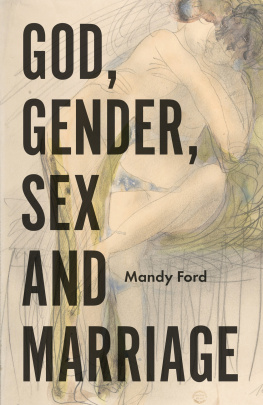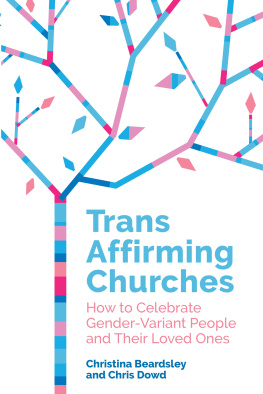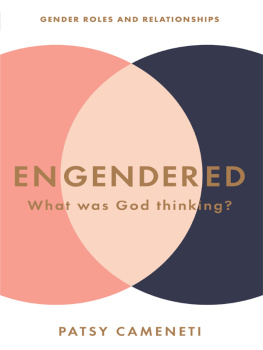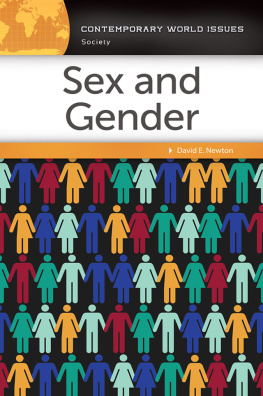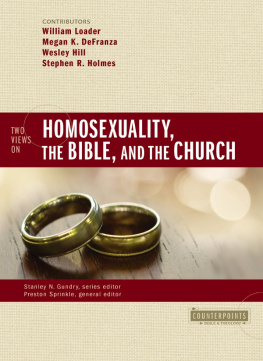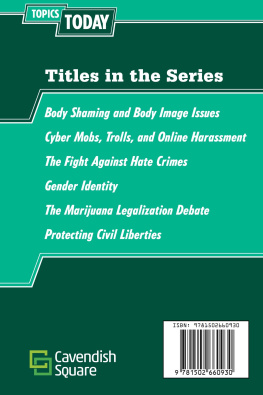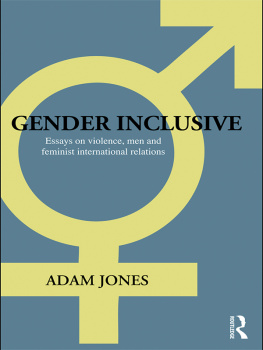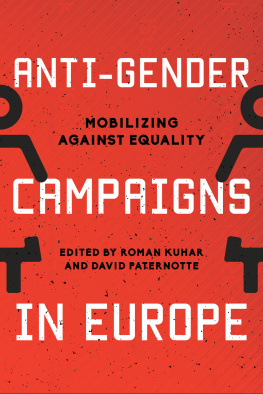
GOD, GENDER, SEX
AND MARRIAGE
Mandy Ford

Jessica Kingsley Publishers
London and Philadelphia
CONTENTS
What the Church of England Has
Said about Sex and Marriage
INTRODUCTION
Im assuming that you picked up this book because you are curious, and that is a great place to start! Perhaps you have a position about the topics covered and wonder how you might defend it. Perhaps you have discovered that others disagree with you, and wonder where their ideas are coming from.
This book came about because I observed people of good heart trying to explore ideas about gender, sex and marriage with each other and struggling to do so. Partly this is because these issues, which involve identity, personal behaviour and the good of society, are very complicated and partly it is because we have often arrived at our positions using different evidence, methods or even world views.
In researching and writing this book, Ive been constantly reminded just what an amazing thing our relationships with other humans are and how through them we come to know and understand ourselves. It turns out that it is possible to use the questions about gender, sex and marriage as a way to go deeper into some of the most challenging questions that humans ask. Dont expect to find answers here, but do be prepared to encounter some very great mysteries, and to get some insight into the complexities of existence.
For those who believe in God, the mystery of existence is fundamentally tied up with the mystery of Creation and the Creator. As a Christian, Im curious about the way in which humans relate to God and relate to each other as fellow creatures. In my experience there is a huge range of views of what it means to be human, loving and sexually active within the Christian church at least as much diversity as there is between Christians and those with different religious allegiance or no faith at all.
Because many Christians (particularly Anglicans) will draw on science and philosophy as well as the Bible and church teaching to shape their views, you will find secular views discussed in this book alongside religious ones. For this reason, I hope that the book will provide a resource for anyone who is curious about human identity and behaviour to explore these questions.
Initially, I was reluctant to write this book because I was rather tired of talking about sex within a church context. As you will discover, gender and sex have been on the agenda of the Church of England since the 1930s. And surprisingly, despite the very small number of people who worship in the Church of England, Sunday by Sunday, there is still media interest in what the church believes and practises with regard to issues of gender, sex and marriage. Rowan Williams, the former Archbishop of Canterbury, has suggested that this is because the church provides a context where the moral anxieties and deep-seated questions that face society can be worked out. Perhaps there is a wider understanding that there is more to all this than just gay marriage that the church is asking the same questions about human identity, relationships and family that matter to all of us.
Even if you are not a person of faith, or a Christian, I hope that there will be questions in this book which interest you. And if you are a Christian, I hope that you will find the questions being asked relevant to you in your journey with God and with other people. We all have bodies and we all have desires. That means that we all have to make choices about how we use our bodies and how we meet, or control, our desires. That means that the topics covered in this book impact on each of us and are deeply personal. They affect real people with real lives and real relationships.
In the past five years it has been my privilege to help facilitate a series of Shared Conversations between people in the Church of England about human sexuality. This has been part of an organised process aimed at helping the church to listen better, prior to making decisions about its teaching and practice. That process has been hard. In those conversations people have shared their life stories and their faith stories. That has been personal and sometimes painful. They have also listened, often to those whose life experiences and faith are significantly different from their own. And that has been harder still. It is hard to listen to someone speak of their same-sex partner with love and affection when your whole heart and mind believes that same-sex activity is wrong. Some people have heard others tell them that their life choices put them beyond Gods loving purpose for their lives. Many faithful Christians have been faced with the huge sadness of believing that friends and family members are condemned to a life without God because of the choices they have made.
As you read this book, you may find yourself reading things which you also find painful. I hope that will help you to appreciate that the same is true for people who may take a very different perspective to you. You will also discover that this is a very complex issue, in which it is not always easy to work out the truth or the right way forward. People have found conversations about gender, sex and marriage very painful because they have seen just how great the differences are between people of good faith, and have discovered how a way forward which seems life affirming and positive to one person may force another to leave the church which has nurtured them.
For some people, the fact that the Shared Conversations in human sexuality took place at all reflected a wrong move on the part of the church. For those people, this book could also be cited as an example of false teaching because it does not simply restate the existing teaching of the church. While I respect that view, it seems to me that the church has moved some way from a simple restatement that, for example, marriage between a man and a woman is the only acceptable context for a sexual relationship, and is now left with something which is neither coherent nor easy to communicate. If the church is going to restate its historic doctrines they will need to be proclaimed afresh to a new generation in a way that does not seem discriminatory but loving. While some Christians are able to do this in an attractive and life-affirming way, others are simply heard as being sexist or homophobic.
I am not trying here to suggest a solution to the churchs dilemma or to offer a programme for change. My purpose is rather to resource people in continuing to reflect on the issues, and to offer some further questions. Other books have done this, in more detail and with more theological depth than is possible here, and I am grateful to them for providing much of the raw material for my own deliberations. However, to some extent they were books primarily intended for students of theology, or for clergy and decision makers. This book emerged, first, from some concern that many lay people in the church were ill-equipped to join the conversation that was taking place; second, from a request from the congregation at Southwark Cathedral, where I serve, for study material to inform their reflections; and finally, in the hope that others might want to be better informed about the Christian perspective on these issues.
All the conversations I have facilitated have taken place in Britain among people who live in a First World culture, which has a particular emphasis on individual choice, and in which family ties and commitments are fluid and economic survival is not a daily anxiety. From time to time, it has been good to remember that we are part of a wider church which includes many members across the world whose experience and priorities are significantly different. They have inherited a Christian tradition transmitted through colonisation and missionary endeavour, which is now being destabilised by changes in the culture from which it originated. There are some places where that destabilisation (which some think of as revisionism) threatens the mission of the church and its influence over the moral and ethical life of nations.
Next page
